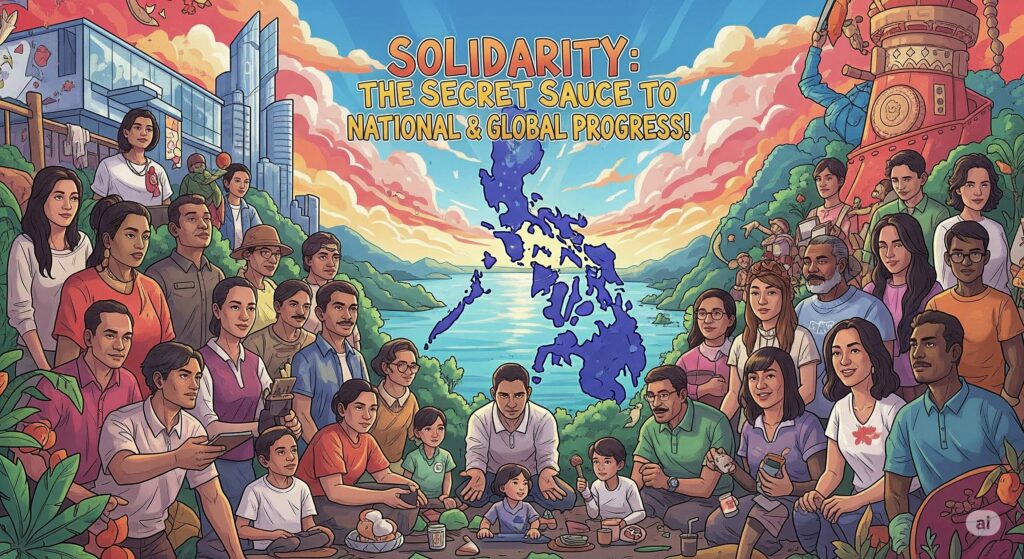Hey there, global citizen! Let’s unpack why solidarity is the ultimate power-up for creating fairer societies and tackling planet-sized problems. Think of solidarity as the glue that holds humanity together—here’s why it matters!
Step 1: Icebreaker – Your Global Connection
🌍 Quick Think:
Name one issue where people working together across borders made a difference.
(Example: “Vaccine sharing during the pandemic!” or “Global climate strikes!”)
Step 2: What Is Solidarity?
💡 Definition:
Solidarity = standing together across differences to fight for justice, equality, or survival . It’s not just “being nice”—it’s active unity in the face of challenges.
🌟 Why It Matters:
- Strength in Numbers : One voice is easy to ignore; millions are not.
- Shared Responsibility : Recognizes that problems (like poverty or climate change) affect us all, directly or indirectly.
Step 3: Solidarity’s Role in National Development
1. Social Cohesion
- Example : In Finland, strong social solidarity supports free education and healthcare, reducing inequality.
- Result : Happier citizens, lower poverty rates.
2. Policy-Making
- Example : Uruguay legalized abortion after feminists, doctors, and lawmakers united in solidarity.
- Result : Laws that reflect diverse needs.
3. Crisis Response
- Example : After Hurricane Maria, Puerto Rican diaspora groups fundraised globally to rebuild homes.
- Result : Faster recovery and community resilience.
Step 4: Solidarity’s Role in Global Development
1. Climate Action
- Example : The Paris Agreement required 195 countries to set emissions targets—global solidarity in action .
- Result : Renewable energy boomed, and vulnerable nations got funding.
2. Human Rights
- Example : The #MeToo movement spread across borders, empowering survivors worldwide to demand justice.
- Result : New laws and corporate accountability.
3. Pandemic Response
- Example : COVAX aimed to vaccinate low-income countries, driven by global health solidarity.
- Result : Millions of lives saved (even though inequities still exist 😞).
Step 5: Challenges to Solidarity
⚠️ Roadblocks:
- Inequality : Rich nations/powers often ignore marginalized voices.
- Nationalism : “Us vs. Them” thinking (e.g., vaccine hoarding during the pandemic).
- Distrust : Historical injustices (like colonialism) make cooperation hard.
💡 Solutions:
- Amplify Marginalized Voices : Center Black, Indigenous, and Global South leaders in decisions.
- Educate : Teach history and interdependence in schools.
- Celebrate Wins : Highlight stories where solidarity worked!
Step 6: Case Study – The Anti-Apartheid Movement
🌍 How Solidarity Changed History:
- National : South African unions, students, and activists united against racism.
- Global : Countries boycotted apartheid regimes, and artists like Miriam Makeba spread awareness.
- Result : Apartheid ended, proving solidarity can topple oppressive systems.
❓ Reflect:
What modern movements remind you of this kind of unity?
Step 7: Your Solidarity Action Plan
🚀 Take Action:
- Locally : Join a community group fighting for housing, education, or climate justice.
- Globally : Support fair trade, donate to international aid, or join global campaigns (e.g., Fridays for Future).
- Daily : Challenge stereotypes and listen to marginalized voices online.
💬 Final Thought:
“Injustice anywhere is a threat to justice everywhere.” – Dr. Martin Luther King Jr.
You’re now a solidarity champion! Whether it’s your neighborhood or the whole planet—remember: together, we’re unstoppable. Questions? I’m here! 😊


